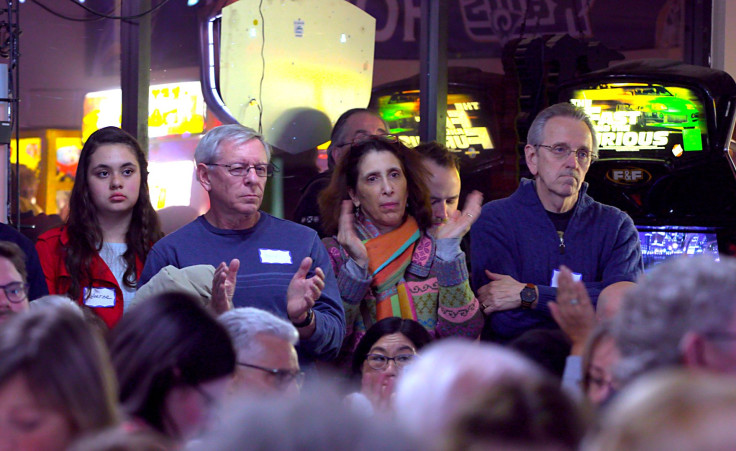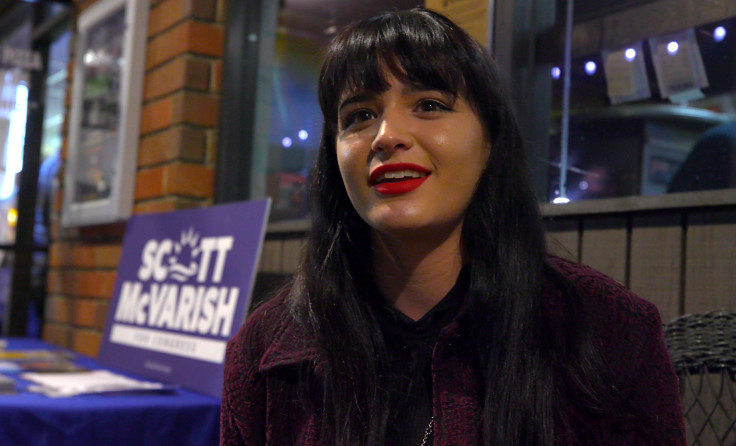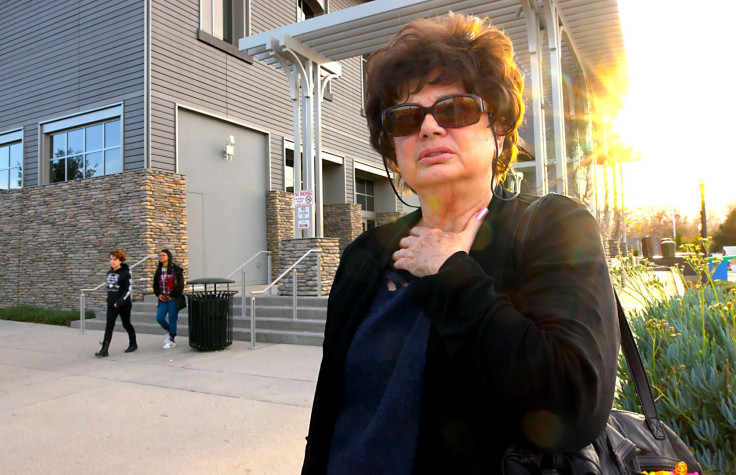Election 2018: Is California Rep. Steve Knight Too Out Of Touch To Be Re-Elected To The House?

Alaina Brooks has lived the last eight years in Lake Los Angeles, a small community located on the eastern edge of California’s 25th Congressional District. It’s a place she calls “kind of a sanctuary,” after living within Los Angeles’ city limits most of her life. “I’ll never go back. I sleep much better here,” says the 53-year-old nurse. “It’s a town where I get to know my neighbors, where I have time to participate on my town council. I have time to be concerned about issues that are impacting our community.”
This story is being co-published with Capital & Main.
The district includes large, arid tracts of northern Los Angeles County, and parts of Ventura County. Once dependably conservative, CA-25 has evolved politically and economically over the decades, delivering new prosperity and problems to the Santa Clarita and Simi valleys, as well as to the less affluent Antelope Valley, whose largest cities are Lancaster and Palmdale. The district is freeway close to urban Los Angeles yet represents a romantic notion of wide-open spaces that still exist amid the region’s accelerating development. (It’s probably best known to TV viewers and film buffs for the jagged landscape of Vasquez Rocks.)

“People generally call it a soccer-mom town – a little red dot in a blue area,” says College of the Canyons student Eric Garcia-Duran, 22, of the district. He is a Trump voter in Santa Clarita whose major is biblical studies, with plans to join the military or law enforcement.
Voters here went solidly for Democrat Hillary Clinton in the 2016 presidential race, but also reelected Rep. Steve Knight, a second-generation Republican office-holder whose father, State Senator William “Pete” Knight, was a former test pilot who wrote the successful 2000 ballot initiative that temporarily outlawed same-sex marriage in California. Trump lost the district by more than six points, but Steve Knight has still voted with the new president nearly 99 percent of the time, according to the nonpartisan political analysis site FiveThirtyEight.
A year ago, hundreds of protesters crowded outside Knight’s office in Santa Clarita, demanding that he not vote to roll back the Affordable Care Act. But working with his fellow Californian, House Majority Leader Kevin McCarthy (R-Bakersfield), Knight was a dependable vote against Obamacare – as were all 14 of the state’s Republican congress members. (The bill later failed in the Senate.) Knight has also stood with the president by supporting the repeal of an FCC rule barring Internet providers from sharing data on their customers. Knight additionally voted to dismantle Dodd-Frank’s financial regulations, to delay raising ozone standards and to ban abortions after 20 weeks. And he voted in favor of the Tax Cuts and Jobs Act, which looked to many like a direct hit on California homeowners — as well as in New York, Massachusetts and other blue states that have the nation’s highest property taxes.
In affluent Santa Clarita, the largest local employer remains the Magic Mountain theme park, but it’s also home to several aerospace manufacturers, the California Institute of the Arts, health-care companies and many other industries. In 2008, bond money was invested in large-scale capital improvements, redeveloping Old Town Newhall into a quaint enclave of shops and restaurants, while adding a major new library. The Antelope Valley is famously home to the Boeing, Northrop Grumman and Lockheed Martin aerospace companies, and has seen significant investment in solar energy. It has also experienced accelerating demographic changes. In Palmdale, the Antelope Valley’s second-largest city, the Latino population grew from 37.7 percent in 2010 to 59.4 percent in 2016. Like other parts of the district, the valley is just as well known as a bedroom community to commuters who daily spend well over an hour on the road or on the rails, including 53 percent of Palmdale residents who travel to work.
As of 2016, median household income in the broader district was more than $75,000. Economic progress, however, has been accompanied by growing homelessness, which barely existed here when Peggy Edwards first arrived 40 years ago. She’s now president of the board of directors at Bridge to Home, a nonprofit homeless services agency in Santa Clarita.
As in other parts of the country, Edwards says, the current crisis of homelessness is rooted in the Reagan years, when public mental health facilities began to close during state and federal cuts to the social safety net “and the promise of community-based mental health was never funded.” In the district, increased affluence and “tremendous development” also led to rising housing costs. In 2008, many families lost their homes in the financial crisis. Some, Edwards adds, became homeless as a result.
During winter months, Bridge to Home offers an overnight shelter with 60 beds, and plans to soon go year-round and add another 20 beds. “You’ll find that most of the people experiencing homelessness have lived or were born and raised here,” she says. “So it’s not [like] people are moving here because we have extra special services or this is a great place to be homeless. We have a number of people who are employed. They just don’t have a home to go to.”

Small-business owner Rebecca Johnston, 56, doesn’t remember the last time she voted for a GOP presidential candidate, but has previously voted for Knight without hesitation. On a recent afternoon at her interior design and home décor shop in Old Town Newhall, Johnston is at her computer crunching numbers and checking email. A local voter since 1986, she calls herself “a middle-of-the-road independent” uncomfortable with ideologues from either direction.
“I’m socially liberal, and I’m fiscally a little bit more conservative,” Johnston explains. “In a lot of ways, [Knight’s] been good for business, good for aerospace. But I don’t think he represented Californians well in this tax legislation.”
Johnson is referring to the GOP’s sweeping new tax law, which Knight voted for and which no longer allows taxpayers to deduct more than $10,000 of local and state income and property taxes from their federal filings. The law also allows taxpayers to deduct interest on up to $750,000 of mortgage debt. Johnston said she didn’t expect the new law’s modest benefits to her business to offset the hit in property taxes.
“I think everybody on the extremes is blind to what’s going on,” Johnston says of Congress. “The people in the middle you can have a dialogue with, and are willing to listen to ideas. … I really dislike this concept of creating legislation behind closed doors and then trotting it out just in time to pass without giving anyone time to pay attention to it.”
Carole Langford, 75, is a retired union employee of Los Angeles County and lifelong Republican voter. Standing outside the towering Newhall branch of the Santa Clarita Public Library, where she takes a computer class, Langford says she is an admirer of President Trump.
“I thank the Lord every day for him. He is doing a great job,” says Langford, who has lived in the district 30 years, and welcomes the growth she’s witnessed across the decades. “It’s new and it’s clean, and it’s orderly and safe. We don’t have to worry so much about someone breaking into our home or the children being safe.”
At the American Legion Hall a few steps away, bartender Natalie Gibbs, 55, is on the front patio taking a smoke break. The bar is host to live music, birthday parties and billiards, and the clientele is discouraged from discussing politics. “Mostly, retired vets are all Republican,” she says. “You get a Democrat in there once in a while and it causes a little chaos.”
Gibbs hasn’t yet given the midterm election much thought. “I’ve been a Democrat, and this last year I went Republican,” says Gibbs, who voted for Trump and the GOP down the line. “I didn’t like the way things have gone the last eight years, so I decided I was going to make a change.”
Steve Knight, 51, stepped into politics full-time after an 18-year career with the Los Angeles Police Department, including time in its controversial CRASH gang unit. In certain ways, he remains emblematic of a large segment of the district’s population, as a former cop with many years experience of driving the same dreary commute as so many of his constituents. But his opposition to progress on LGBT rights and his general support of Trump puts him at odds with many in the state.
Knight has voted to make concealed carry permits valid across state lines and to repeal the Obama regulation that made it difficult for people with documented disabling mental illness to purchase guns. He did split from the president on Russian sanctions and, like many House Republicans, called Trump’s tariffs on steel and aluminum imports “bad for business” and “ill-advised.”
The district has tilted Democratic before, going for Barack Obama in 2008, but otherwise voting for the GOP candidate in 2000, 2004 and 2012, before choosing Hillary Clinton in 2016. Whether or not that reflected genuine local affection for Clinton, recent polls hardly suggest that Trump’s popularity has improved in California.
A 56 percent majority of voters in the 25th District are currently disinclined to reelect Knight, according to the latest Berkeley-IGS poll — which finds that among likely voters his votes for the president’s tax bill and against Obamacare make 52 percent of them less likely to support him again. The survey also reveals that the same percentage of voters in the 25th District have decided that GOP control of both houses of Congress is “a bad thing.”
One night at Vincenzo’s Pizza in Newhall, there’s an overflow crowd for a Democratic candidate’s forum. The mood is upbeat but serious as voters sit at tables piled high with pizza and soft drinks, and a row of candidates takes questions.
Standing just outside the pizzeria is one of the district’s newest voters, Julie Damon, 18, a high school senior who will cast her first ballot this year. “A lot of us can’t watch the news now without getting mad or worried,” Damon says of her friends. “There’s a lot going on. And it’s really scary when you feel that you don’t have a say. Coming here and getting involved is really important.”
Damon was on a school trip to Washington DC early last year, and witnessed the massive Women’s March the day after Trump’s inauguration. “It’s really cool to see a lot of like-minded people around me, and to see people that want change in the world,” she says. “That was the one thing I was excited about when I turned 18 — I can vote. I can do something now.”
As younger generations move into the district, that feeling is only growing in CA-25. One recent arrival is Chris Sorelle, 27, a photographer and musician who voted for Bernie Sanders in the presidential primary. Since arriving from Virginia last year, he’s closely kept up on the weekly controversies in the White House and Congress.
“If there’s one blessing to be had in that, it’s that people are now active and researching things,” says Sorelle, standing outside the Brave New World Comics store in Santa Clarita with his Chihuahua, Louie.
At the Bridge to Home shelter, Peggy Edwards has taken notice of the influx of young new residents. “People moving in tend to be more progressive in their thinking,” she says.
Blue State/Red District: California's 25th Congressional District from CAPITAL & MAIN on Vimeo.
At a quiet coffee house near his apartment, student Eric Garcia-Duran sits with his Bible and laptop, catching up on his religious studies homework. In 2016, he voted for Trump, Knight and the GOP down the line, but he’s lost faith in his choice for president. “If I could go back, I would not vote at all for the president and just leave a blank spot,” says Garcia-Duran, who identifies as solidly conservative. He fully supports some Trump policies, but has been alarmed by other aspects of the current administration. “The kind of ethics and morals that he’s espoused — ultimately I don’t think those are ideal for the whole nation.”
White House stories of bullying and porn stars aside, it’s the deeply practical issues of health care and economic growth that have got the attention of many voters at the congressional level.
Construction supervisor Patrick Peters, 59, is an independent voter who wants to see illegal immigration stopped, but accompanied by an easier path to legal immigration. He’s opposed to Trump’s border wall. In his industry, he says, fewer young Americans are attracted to construction work: “Everybody wants to work on computers.” If the flow of immigrants ended, so would many of the kind of development projects that have fueled growth in CA-25. “I think it would stop some of the construction because they would have to pay more to get the buildings built,” Peters says. “I don’t think they’re willing to do that now.”
Peters, who lives in Saugus, was in the military for five years as a member of the Navy Seabees construction unit. On the chest of his blue hoodie is a bald eagle. He’s lived in the district since 1986 and is deeply irritated by Congress. “It seems that they won’t work together enough,” he complains, and says of the ongoing health-care debate there: “The plan that Congress gives us, they should be on. They shouldn’t be on a separate plan.”
Health care, and the Republican attempt to end the Affordable Care Act, will likely play a major role in the election. The ACA remains popular across the state, and Lake Los Angeles’ Alaina Brooks was among those to turn up outside his office and at town hall meetings last year, inspired by Knight’s attempts “to dismantle the Affordable Care Act,” she says. “Working as a care provider caring for the disabled, I was really concerned. ”
What happens in the state’s 25th Congressional District will have major consequences, both for the community and for events in Washington DC. For nurse Brooks, it will be a long season of community activism and suspense.
“I’m not taking anything for granted,” she says. “I’m doing a lot of praying.”
Copyright Capital & Main
© Copyright IBTimes 2024. All rights reserved.




















